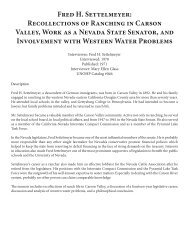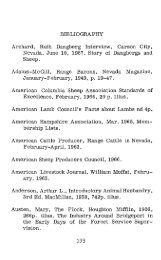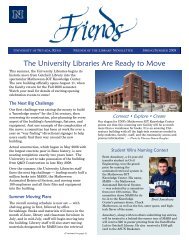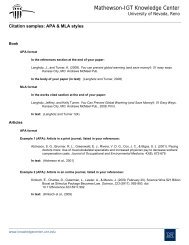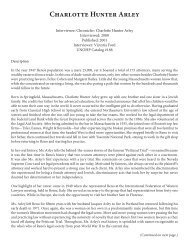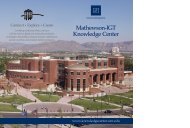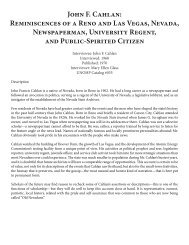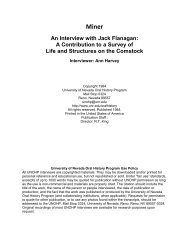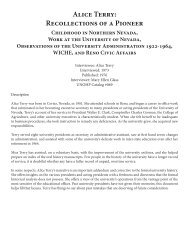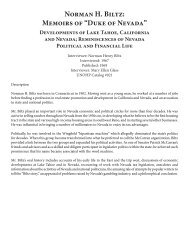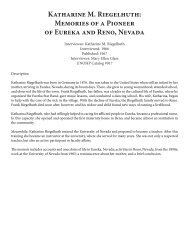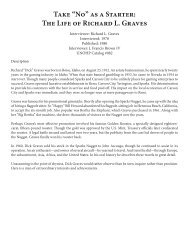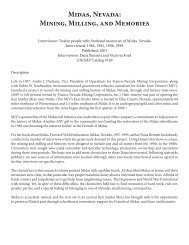Silvio Petricciani - University of Nevada, Reno
Silvio Petricciani - University of Nevada, Reno
Silvio Petricciani - University of Nevada, Reno
You also want an ePaper? Increase the reach of your titles
YUMPU automatically turns print PDFs into web optimized ePapers that Google loves.
54 <strong>Silvio</strong> E. <strong>Petricciani</strong><br />
I said, “Do you mean to tell me I can’t fly<br />
my airplane out <strong>of</strong> here now?”<br />
“I didn’t say that,” he says, “we’ll be glad<br />
to see you go!” [Laughs]<br />
So when I came back to <strong>Reno</strong> after that<br />
little episode, why as I told you I belong to an<br />
organization called the Quiet Birdmen. (And<br />
as a matter <strong>of</strong> fact this fellow that just called<br />
me now is going to be initiated into it tonight,<br />
Bill Skliar. He’s a retired colonel from the Air<br />
Force, and he was the test pilot at Edwards<br />
Air Force Base when they were testing this<br />
SR-71 which flies at eight thousand feet and<br />
above, and flew from New York to London,<br />
England in one hour. But, real wonderful<br />
person. Now he’s teaching gliders out at Stead<br />
airport.) But anyway, when I got back, there<br />
was a gentleman by the name <strong>of</strong> Jack Walsh<br />
who was an instructor out at Stead and also<br />
my sponsor in the Q-Bird organization—he<br />
and Gene Hughes whom you met today. And<br />
I recounted my experiences. Lo and behold,<br />
and there again I show you the camaraderie<br />
between people who fly; he said, “This does it.”<br />
He says, “You’re going to learn instruments.<br />
If you’re going to fly into that area,” he says,<br />
“I want you to be able to make an approach<br />
into an airport and land safely.”<br />
So he had his own airplane, and <strong>of</strong><br />
course I had my Aztec. And for no charge<br />
whatsoever, this gentleman used his airplane<br />
and sometimes mine (it’d all depend on which<br />
one was available and what type <strong>of</strong> work he<br />
wanted to do); and every night after I’d get<br />
through here, we would go out and fly. And<br />
he was a tough taskmaster because he left<br />
nothing to chance at all, and he demanded<br />
absolute attention and precision. And he<br />
taught me instrument flying; we took a trip<br />
back East, and we flew instruments eighty<br />
percent <strong>of</strong> the time. This was before <strong>of</strong> course<br />
I got my license. He was with me, and we<br />
flew instruments all the way. We got into,<br />
you might say, every conceivable situation.<br />
We went from <strong>Reno</strong> to New Jersey, then<br />
New Jersey down to New Orleans back to<br />
Albuquerque, Albuquerque into Las Vegas,<br />
<strong>Nevada</strong>, and then Las Vegas, <strong>Nevada</strong> back<br />
to here. And <strong>of</strong> course, like I say, the radio<br />
equipment that I had then was much more<br />
sophisticated than the way I originally learned<br />
it. And I learned how to fly instruments, and<br />
I haven’t been in trouble since. But now I’ve<br />
been through icing conditions, and I’ve had,<br />
we’ll say, ninety percent <strong>of</strong> the experiences<br />
that most <strong>of</strong> the pilots have. But again there’s<br />
an adage: There are old pilots and bold pilots,<br />
but there are no old, bold pilots.<br />
But <strong>of</strong> the people that I have met in the<br />
flying business, there are many characters<br />
including myself, but they’re all good people<br />
and they’re all good pilots. And the pro<strong>of</strong><br />
that they are is that they’re all still alive. And<br />
amongst the fraternity in the Q-Birds we<br />
have people— well, we have one for instance,<br />
Joe Sanders. He’s seventy-two years old and<br />
still instructing. We have Marty Cromberg<br />
who is still flying; he’s in Minden now<br />
(was an instructor in World War II), crop<br />
duster.* Gene Hughes was a crop duster in<br />
Sacramento. Crop dusting is a very hazardous<br />
occupation because they have to zoom down,<br />
let go <strong>of</strong> their load <strong>of</strong> dust or whatever it is and<br />
then go on back up, and there’s power lines<br />
and everything all around the fields, but all<br />
these people have survived, and they’re just<br />
that much the better man for it.<br />
We have airline pilots that belong to the<br />
organization. And when you talk to these<br />
people and tell them the experiences you’ve<br />
had, they’ve all been through the mill, every<br />
one <strong>of</strong> them, and flying a 747 is no different<br />
than flying the smallest airplane. They all have<br />
their problems, and they all have wings, and<br />
they all fly. They all fly the same. The only<br />
thing is you’re a lot heavier and a lot bigger.



